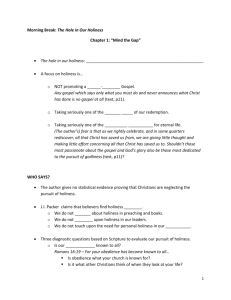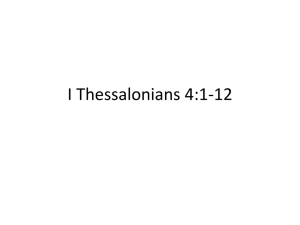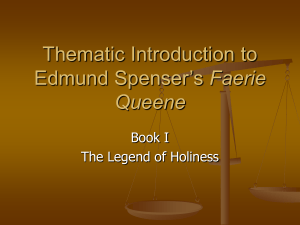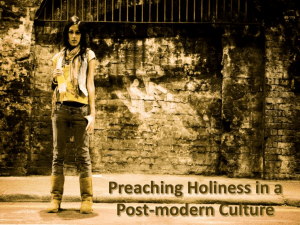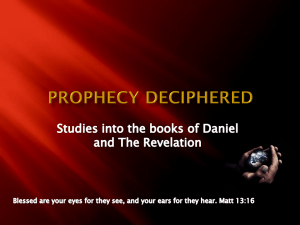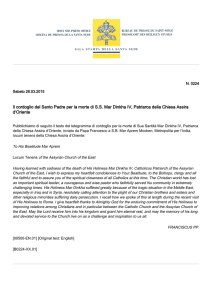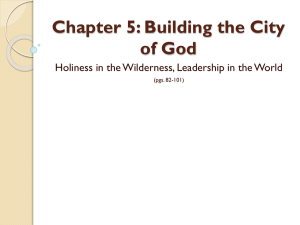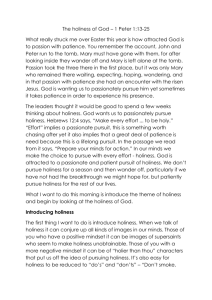Powerpoint Document
advertisement
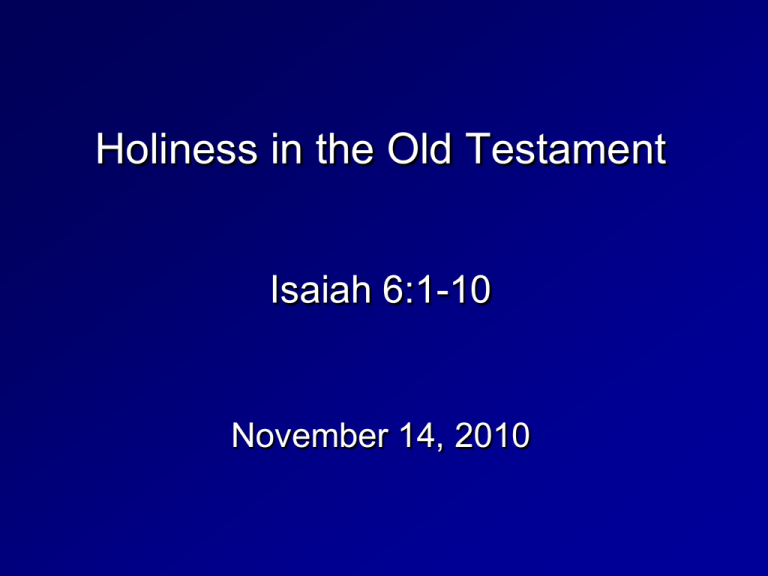
Holiness in the Old Testament Isaiah 6:1-10 November 14, 2010 I. Introduction A. A confession B. How important is holiness? 1. R. C. Sproul (The Holiness of God, pp. 2425) 2. J. I. Packer (Knowing God, p. 183) 3. Other reasons for the importance of this subject: a. We are commanded to be holy (1 Peter 1:14-16). b. Christians are destined to be holy c. It is the basis and motivation for our worship (Psalms; Revelation 4:8-11). d. We cannot see God without it (Hebrews 12:10, 14). I. Introduction C. Why authors deal with holiness as they do 1. J. I. Packer: no chapter on the holiness of God in Knowing God 2. R. C. Sproul (The Holiness of God, p. 53) 3. How would you define “holy” and its opposite? D. My approach 1. An attempt at a definition of holiness 2. Holiness as revealed in the Old Testament 3. The problem with holiness 4. O. T. indications of the solution 5. Practical implications and applications II. A definition of the holiness of God A. The incomparable (unrivaled) excellence of God (Tozer, Knowledge of the Holy, p. 104) II. A definition of the holiness of God B. The unfathomable excellence of God (Tozer, p. 104). C. The collective excellence of God (Kenneth Prior, The Way of Holiness, p. 17; Sproul, p. 57). D. The awe inspiring (fear/reverence producing) excellence of God (Packer, p. 183). E. The holiness of God and the glory of God (Exodus 33 and 34). III. The holiness of God is revealed at the exodus. A. Exodus 3:5 (“Take off your shoes. . .”) B. Exodus 5:2 (“Who is the LORD . . .?”) C. Exodus 12:12 (judgment on the gods of Egypt) D. Exodus 15:1-18 (Israel’s song) E. Exodus 18:11 (Jethro) F. Exodus 19:4-6 (a “holy nation”) G. Exodus 20:3 (“No other gods . . .”) H. Exodus 32ff. IV. The problem of a holy God and sinful men A. Isaiah 6:1-5 (see Exodus 33:1-3; Habakkuk 1:13) B. Moses strikes the rock (Numbers 20:12; 27:12-14; Deuteronomy 32:48-52) C. Uzzah touches the ark (2 Samuel 6:1-11) D. Nadab and Abihu – “strange fire” (Leviticus 10:1-10) E. Joshua 24:19 V. God’s provision for a sinful people A. The Mosaic Covenant (Exodus 34:9ff.) B. The promise of divine cleansing (Isaiah 6:6f.; 52-53; Ezekiel 36 C. Deuteronomy 30:1-6f.; Jeremiah 31; Ezekiel 36:16 VI. Conclusion: Implications and applications A. God’s holiness is the standard which reveals man’s sin and need of salvation. B. God’s holiness is a death blow to pluralism. C. God’s holiness is the motivation and content of our worship. (If His holiness is infinite, then worship should never be dull or repetitive – we’ll be doing it for eternity.) D. God’s holiness is the basis for our faith and confidence. E. Grasping God’s holiness sustains us in suffering and silences our objections (Psalm 73; Job; Habakkuk 3; Hebrews 12:10, 14).

